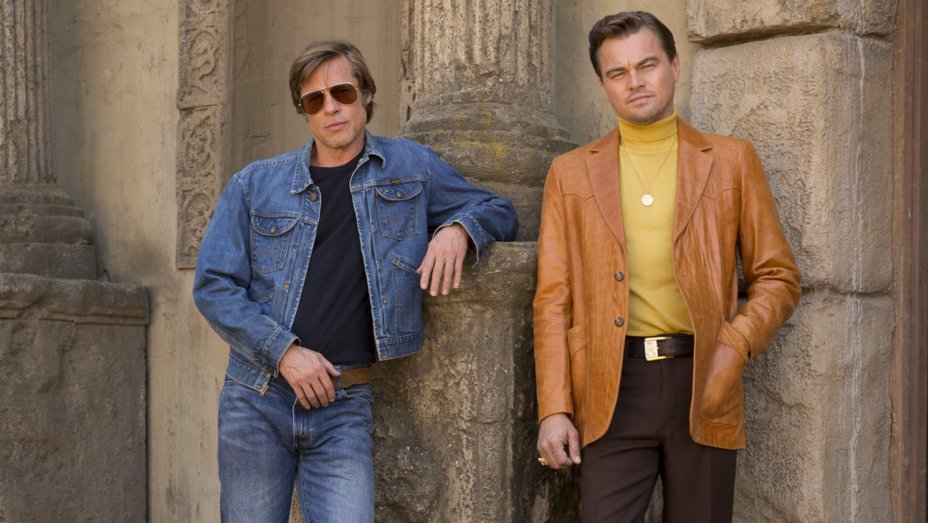
It’s pretty clear from Quentin Tarantino’s dialogue and homages from his many films that he’s a huge movie nerd, to say nothing of his many exciting chats about his favorite films. Once Upon a Time in Hollywood is his ultimate tribute to his obsession with the medium. His film not only basks in the glow of the retro movie scene from 1969 but also humanizes it with an emotional twinge of the twilight of careers. We get to spend a lot of time in this era and with these characters that there’s an intoxicating romance of the fantastic and wicked elements of showbiz, complete with all the delicious Tarantino-isms we’ve come to expect.
There’s plenty of characters to follow, but we mostly stick with Rick Dalton (Leonardo DiCaprio) and Cliff Booth (Brad Pitt). Rick is a washed-up actor, having failed to be a continuous hit in a 1950s Western TV series and can see the writing on the wall with his many guest spots and Spaghetti Westerns in his future. Realizing his days in the sun are numbered, he turns into an emotional mess, breaking down into tears and bitterness at everything from his best to his worst acting on set. More mellow, but with more to lose, is his stunt double and best friend Cliff Booth. With sunglasses constantly over his eyes and a grin always on his face, he always seems to be taking things well, even if he isn’t working every day and lives out of a trailer. At least he still has his dog and keeps his spirits up, as well the spirits of Rick as well.
There are other characters followed that are not so much fictional or amalgamations but the real deal. Rick is more or less a composite of Steve McQueen but then Steve McQueen himself will also be a character. These real actors and directors who appear in the film are mostly kept at a distance which maintains a certain fascination and idolization of their mystique. It may sadden many to know that Sharon Tate (Margot Robbie) fits this same aspect but I was rather impressed with her usage. She is seen as a happy soul that delights in strolling into a cinema to see her work on the big screen, thinking back on how much she put into the role and basking in the reactions of the audience. She is nothing short than the warm glow of joy, unaware of what tragedy will befall her in the next few months.
Also kept at a distance is the evil. Of course, Charles Manson (Damon Herriman) is in the picture to keep with the story of Tate’s demise but kept at an even further distance. We don’t spend much time with him but we do follow plenty of his followers. This creates a wonderfully emotional duality of good and evil, where we know both exist but are only witnesses to those that orbit their influence.
With this style of narrative, Tarantino’s picture allows for a meandering quality where get to ride shotgun for a Sunday drive down 1969 Hollywood. Little details are harped on with keen eyes and ears, from the style of cars to the design of movie posters to the adverts on the radio. There are many scenes where the characters just amble through their environments and it’s fascinating to just watch them do anything from driving around the city to having a quiet meal at home. It’s nothing short of that gorgeous golden vision Tarantino has no doubt been locked up in his dreams for years, splattered onto the screen in vivid splendor.
Naturally, we can’t forget Tarantino’s trademarks still firing on all cylinders. Movie nerd trivia is spouted either directly or visually. Scenes of great dialogue will carry on for long stretches with brilliant acting that takes us down some interesting holes. The violence, though more sparse than that of Tarantino’s previous movies, is just as vicious and bloody as it was in his other productions. As his ninth film, this is a masterpiece that would be more than acceptable as a final film, considering the picture addresses the somberness of something coming to an end while still embracing the good times with his wicked sense of storytelling. Only Tarantino could make a film like this so gleefully nostalgic and deeply engrossing.

 “My Spy: The Eternal City” Review
“My Spy: The Eternal City” Review  “Deadpool & Wolverine” Review
“Deadpool & Wolverine” Review  “The Boys: Season Four” Review
“The Boys: Season Four” Review  “The American Society of Magical Negroes” Review
“The American Society of Magical Negroes” Review  “Twisters” Review
“Twisters” Review  “Sausage Party: Foodtopia” Review
“Sausage Party: Foodtopia” Review  “Robot Dreams” Review
“Robot Dreams” Review  “Godzilla x Kong: The New Empire” Review
“Godzilla x Kong: The New Empire” Review 


